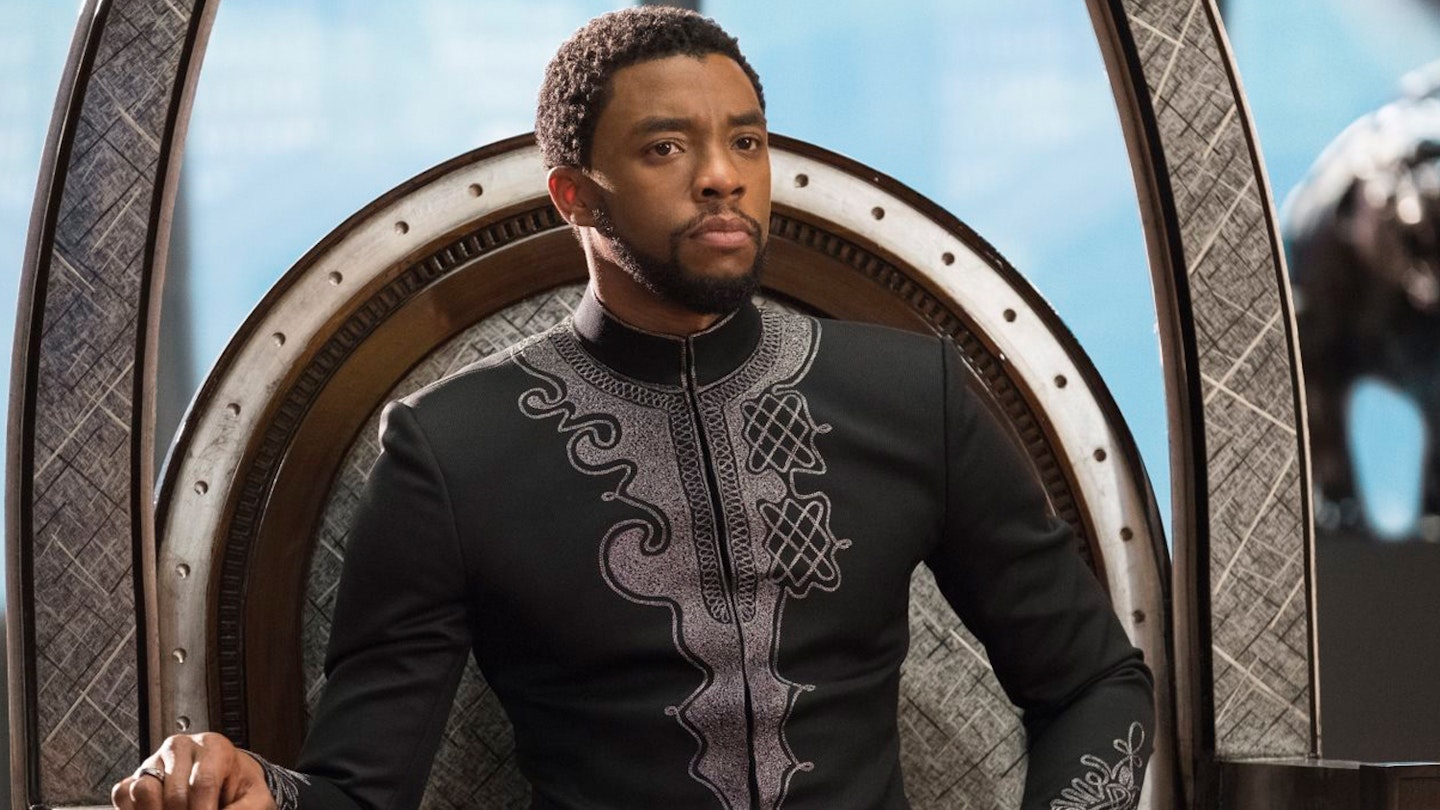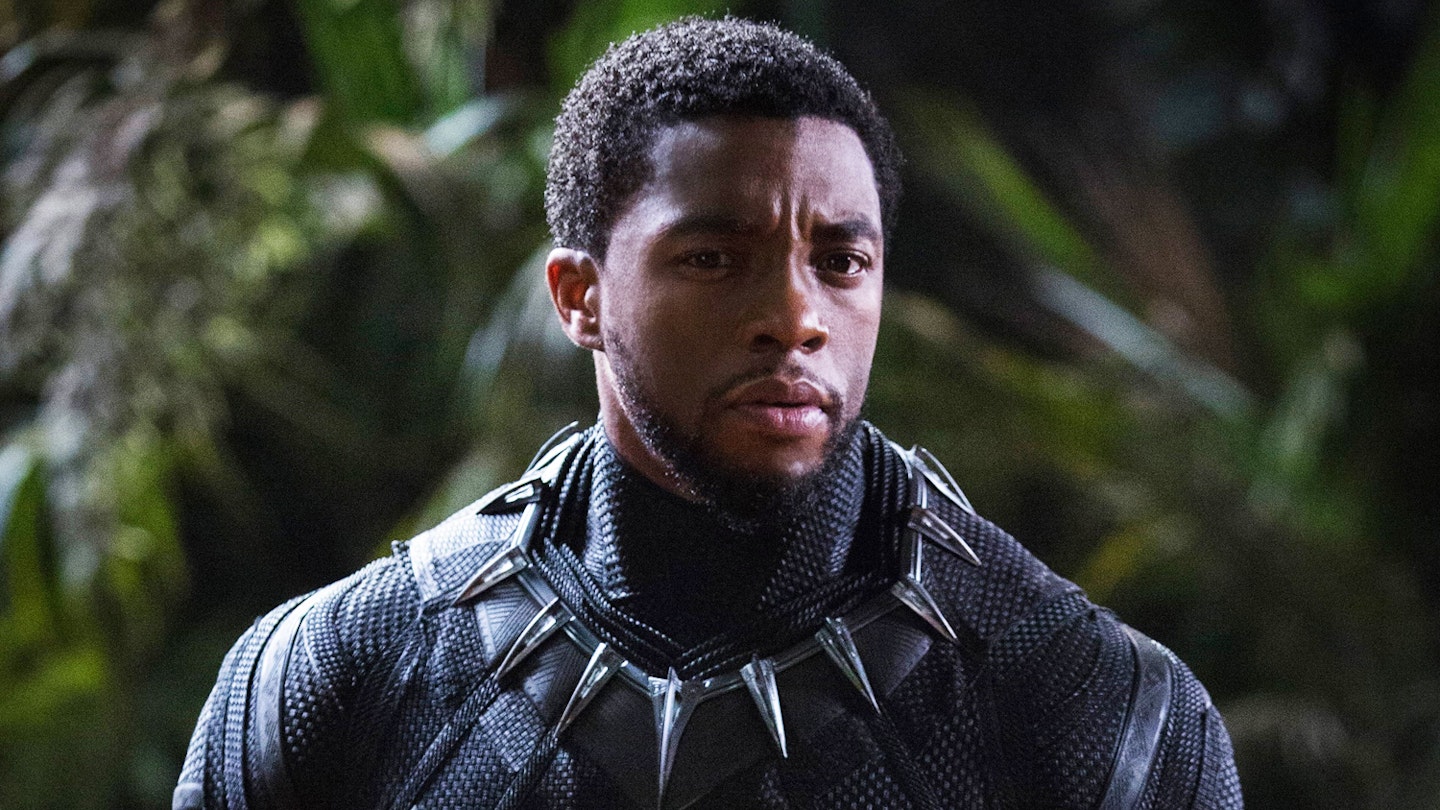In Black Panther, T’Challa has a choice. He’s become King of Wakanda and inherited the Black Panther mantle after the death of his father, T’Chaka, in Captain America: Civil War. So just what kind of leader is he going to be? Come the end of the film, he’s realised what he needs to do: use the power he’s had bestowed upon him and open it up to the world, sharing Wakandan resources to improve the future of kids – especially Black kids in deprived neighbourhoods – in America and beyond. That’s his legacy as a superhero. Some costumed heroes merely fight crime. Others reckon with the root of societal inequality.
That journey in Black Panther – from grief, through conflict, and into renewed resolution and purpose – was played beautifully by Chadwick Boseman. Some say Michael B. Jordan’s Killmonger, bubbling with righteous fury, steals Ryan Coogler’s film. But Boseman is another kind of force at its heart, imbuing T’Challa with poise and charismatic stoicism – there’s a peacefulness to him, even when faced with a murderous usurper who has violent revolution on his mind. “Is this your king?” asks Killmonger in one key scene. Thanks to the regality of Boseman’s performance, there’s no question – T’Challa is our king.
Boseman’s legacy is Black Panther. That film, that character, is the gift to the next generation.
If T’Challa had to figure out where to direct his power and resources, so too did Boseman. Here was an actor whose considerable talent and bountiful screen presence made him one to watch before he climbed to the A-list – in his embodiment of legendary baseball player Jackie Robinson in 42 (2013) and his portrayal of James Brown in Get On Up (2014), he stood out as a rising star. It was only natural that he’d ascend to the big leagues. And that ascent was swift. Two years later, he became Marvel’s highest-profile Black superhero playing Black Panther in Civil War, and would go on to be the MCU’s first Black lead in his solo film – a $1.3 billion worldwide smash, the fourth-highest-grossing film of all time in the US, and a blockbuster film that was so much about the Black experience and representing ancestry and power in Blackness.

There’s a reason why Chadwick Boseman’s Black Panther movie was such a monumental success. Yes, it was the latest chapter in a major movie franchise. Yes, it offered vital Black representation on a multiplex scale, rooted specifically in African culture and imagining a place within the African continent that hadn’t been blighted by the brutal forces of colonisation. But it’s also because T’Challa’s journey was really about something – despite taking place in a fictional superhero universe, Black Panther is in direct conversation with our own world. What is your legacy? What do you do with the power that you have? How do you give back to the world?
The closing scene of Black Panther embodies this best. T’Challa and Shuri visit the Oakland basketball court next to the building where the young Killmonger grew up, without a father and without options. He’s going to turn it into a Wakandan Outreach centre. And the first people he reveals his advanced technology to? A group of kids.
It was always a gorgeous, thematically rich ending. But it resonates even louder now, in the wake of Boseman’s tragic death, taken at the age of 43 after a battle with colon cancer that he fought privately for four years. As we begin to process his untimely passing, it’s clearer than ever – Boseman’s legacy is Black Panther. That film, that character, is the gift to the next generation, there to be an example, to be an iconic action hero, to be a rallying cry to future generations, particularly of Black people and marginalised communities: this is possible. Knowing now that Boseman was playing the role of T’Challa across Black Panther, Avengers: Infinity War and Avengers: Endgame while also facing illness, surgery, and chemotherapy, that he knew his time was likely limited, only makes his work, his resolve, his gesture, more heroic and powerful. What is your legacy? What do you do with the power that you have? How do you give back to the world? T’Challa figured it out, and Boseman did too.
Boseman knew just what this character meant. The internet is today awash with clips from interviews and awards speeches, in which he speaks to the reasons why T’Challa and his big-screen exploits spoke to so many. “To be young, gifted, and Black, we all know what it’s like to be told that there is not a place for you to be featured,” he said at the SAG Awards. “We knew that we had something special that we wanted to give to the world. That we could be full human beings in the roles we were playing. That we could create a world that exemplified a world that we wanted to see.” In Black Panther, Wakanda presented us with such a world. And the film itself moved the needle on our own world too.
From Da 5 Bloods’ Stormin’ Norman, to 21 Bridges’ Andre Davis, to his multiple biopic roles, Boseman’s body of work is full of brilliant performances. But bringing Black Panther to the big screen was his greatest achievement – something that will live long, long beyond him, inspiring generations to come, and enacting real, tangible, positive change both in the movie industry, and in the wider world. It is, truly, a gift, and so was he. Wakanda forever. Chadwick Boseman, forever.
